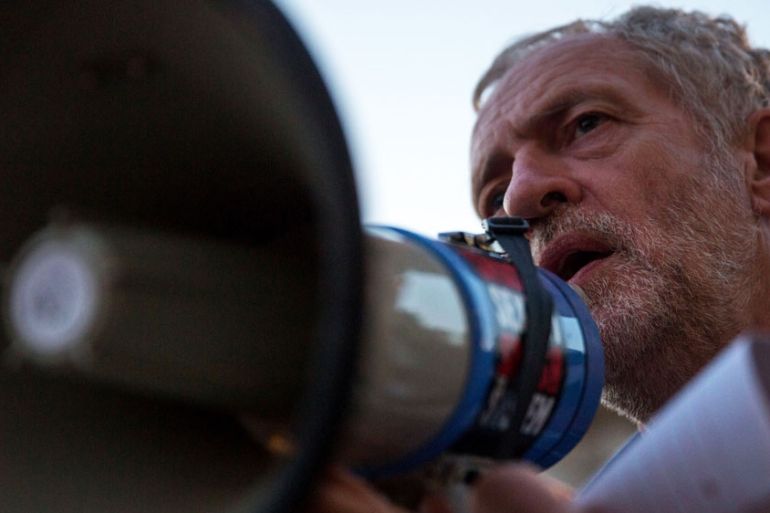Politics of the disenchanted
Labour’s new leader promises to transform British politics, but the first challenge is to reach beyond his constituency.

The Guardian journalist Seamus Milne hailed it as “a political eruption of historic proportions”. The Prime Minister David Cameron claimed it represented a threat to Britain’s national security. Whatever else it may achieve, Jeremy Corbyn’s success in gaining the leadership of the Labour Party has certainly unleashed the surreal in British politics.
To understand more soberly what the left-wing maverick’s overwhelming victory – and the humiliation of Labour’s mainstream candidates – might mean, we need to first answer how Corbyn achieved his success. The key was the manner in which the post-war political system, which was built on the divide between social, democratic, and conservative parties, is now being dismantled. It is a process that can be seen not just in Britain, but throughout Europe.
Keep reading
list of 4 itemsTrapped, abandoned: Filipino workers lured to Poland by shadowy agents
EU countries endorse diluted draft rules on gig economy workers’ rights
On 40th anniversary of UK miners’ strike, can Labour win back the north?
|
|
The gap between voters and the elite has alarmingly widened.
Voter disaffection
The main beneficiaries of this process have been right-wing, anti-immigration populist groups, such the National Front in France and Independence Party in Britain. But parties towards the left – like Syriza in Greece, Podemos in Spain, the Scottish National Party – have also been able to tap into that popular disaffection. Corbyn has done the same.
What makes Corbyn’s success different, however, is that this is the first time that a mainstream social democratic party has become a vehicle to express disaffection with mainstream politics. This says as much about the state of the Labour Party as it does about Corbyn’s ability to reach out beyond the mainstream.
Ever since the 1980s, the Labour Party has been hostage to reinvention. The triumph of Thatcherism, the neutering of trade union power, the rejection of old-style Keynesian politics, a greater acceptance of the market principle – all have helped deprive the party of both its social base and its raison d’etre.
After a decade of internal civil war, the party was reborn in the 1990s as the “New Labour”, a media-savvy, technocratic, middle-ground party that had largely cut its links with the working class. It became, under the leadership of Tony Blair, a powerful machine to win elections. But it also became hollowed out as a living, breathing political party. In the decade after 1997, the Labour Party won three successive elections – but lost nearly a quarter-of-a-million members.
The combination of popular disaffection and an ideologically shallow Labour Party has provided Corbyn with his opportunity. But how will his success change the Labour Party and politics more generally?
Traditional Labour
Corbyn’s supporters argue that his victory will help revitalise the democratic process, and give ordinary people a political voice that they have lacked. There is certainly something refreshing about Corbyn’s willingness to talk of political values and principles, rather than merely repeat what might be electorally safe. Yet, what has been striking about Corbyn’s first week as Labour’s leader has been his unwillingness to reach out beyond his natural constituency. In all his speeches, Corbyn has addressed those who already support him, but not beyond. He has shunned the media and often refused to answer journalists’ questions. Corbyn complains that the media is biased and wants only to demonise him. There is truth to that, but his dismissal of the media also shows a disregard – even contempt – for the wider audience and an unwillingness to be held to account.
Also read: The UK’s avoidable hardship
Traditional Labour politics was less about building mass democratic movements than about looking to the state to act as a lever of social change. Corbyn follows in this tradition, which is why many of his policies are often deeply illiberal, for instance, the support for legal constraints on hateful and unacceptable speech and state regulation of the press.

Even where Corbyn has attempted to promote popular democracy, the results have not been particularly democratic. Much has been made of his first appearance as Labour leader at the Prime Minister’s Questions convention – a weekly ritual in the parliament, at which the prime minister faces questions from the leaders of the oppositions and other MPs. It is one of the few occasions at which the prime minister can be held publicly to account. Corbyn decided to crowdsource his questions. Cameron was able easily to answer questions from “Marie”, “Claire”, and others who had emailed Corbyn, but faced no interrogation from Corbyn himself. The result was not greater democracy, but less accountability and an abdication of leadership.
Corbyn’s elevation to Labour leader is neither an historic shift nor a national threat. It is another expression of voter disenchantment. Labour’s new leader has shown little evidence that he knows how to shape disaffection in a progressive fashion. The danger is that Corbyn’s impact may be to fuel even greater disillusionment with the political process.
Kenan Malik is a London-based writer, lecturer and broadcaster. His latest book is The Quest for a Moral Compass: A Global History of Ethics. Previous books include From Fatwa to Jihad (2009), shortlisted for the 2010 George Orwell Prize. He writes at Pandaemonium: www.kenanmalik.wordress.com
The views expressed in this article are the author’s own and do not necessarily reflect Al Jazeera’s editorial policy.
